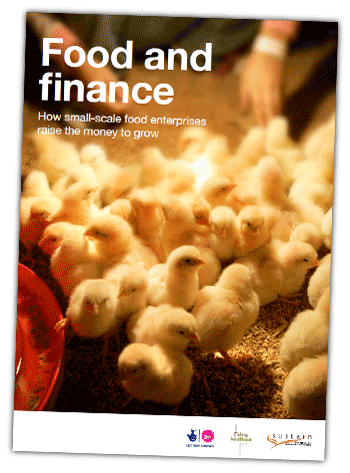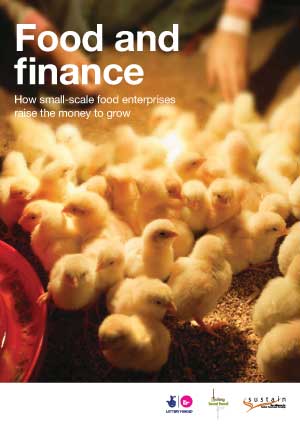Reports • Making Local Food Work
Food & Finance: How small-scale food enterprises raise the money to grow
The Food & Finance report presents the findings of research into how small-scale food businesses and community food enterprises have secured funding to support their work. It also presents a summary of interviews with representatives from a range of lenders and funding organisations, and their views on challenges particular to the small-scale food sector.
 The Food & Finance report presents the findings of research into how small-scale food businesses and community food enterprises have secured funding to support their work.
The Food & Finance report presents the findings of research into how small-scale food businesses and community food enterprises have secured funding to support their work.
It also presents a summary of interviews with representatives from a range of lenders and funding organisations, and their views on challenges particular to the small-scale food sector.
Our research shows that small-scale food enterprises have so far often been partly or heavily dependent on grant funding, from a range of government and charitable sources. But a shrinking pot of grant money, and growing political antipathy to provision of money by government, means that a looming ‘funding gap’ is forcing these organisations to think more creatively about the way they fund themselves, and how they can reach a situation where they are operating on a more financially viable basis. This raises many questions for community food enterprises in terms of the future source of money for start-up finance, capital equipment, and investment to grow. This is especially challenging for social enterprises, co-operatives and small-scale food businesses seeking to address social and environmental issues through food.
Due to low or slow profitability, and few assets against which to secure loans, such enterprises may be ill-suited to loans from mainstream commercial banks. Progressive lending and community finance, and continuation of grant funding, are therefore important considerations.
The key findings of our research were as follows:
- The government has had an important role in funding the small-scale and community food sector through direct grants or through policies such as the tax break for micro-brewers.
- The small-scale and community food sector has often depended on cash from owners and their family and friends, particularly to get started.
- Amongst our case studies there was little involvement of community development finance institutions in the small-scale food sector.
- Among our interviewees, very little funding had been obtained as conventional business loans from mainstream banks.
- Low margins and ‘slow return’ on many food products are likely to make the businesses that produce them unattractive as potential clients for the commercial banking sector. The same factors are also likely to make it difficult for small-scale food enterprises to meet the requirements of mainstream commercial bank loans, especially those with social aims.
- The increasingly impersonal nature of finance and lack of personal relationships between lenders and borrowers has further hampered funding from the conventional banking sector.
- Lenders and producers talk different languages and lack understanding of each other’s particular circumstances and needs, and how to present themselves to each other.
- Free business advice has played a vital role in helping businesses develop their structures and processes so they become attractive to funders and lenders. The demise of specialist business services such as Business Link, and temporary nature of charitably funded sources of community enterprise support are therefore a cause for concern.
- Over the last couple of years there has been an increase in funds being raised through community share issues and other creative means. If carefully developed, with appropriate safeguards, these may be a fruitful source of finance for community food enterprises.
This report forms part of a wider research project on Sustainable Food Finance, commissioned by Sustain in 2012, aiming to make recommendations for how small-scale food enterprises, and funders, should develop their work to support the vitality of the community food sector.
The report was developed and published as part of the Big Lottery Making Local Food Work programme.
A sister report, entitled "Financing community food: Securing money to help community food enterprises to grow" makes recommendations to the investment sector, and others supporting community food enterprises, to help the sector continue to use food to achieve a wide variety of important social and environmental benefits.
Report contents
Summary
Acknowledgements
Introduction
How we undertook the research
Sources of finance
- Cash from owners, their families and friends, and Business Angels
- Asset finance
- High-street banks and building societies
- Specialist social investment lenders
- Community Development Finance Initiatives
- Co-operative finance
- Community Supported Agriculture
- Community finance
- Crowdfunding or crowdsourcing
- Government backed loan
- Other investment approaches
Views from the finance community
The case studies
- Fruit and vegetables
- Meat and dairy
- Cheese
- Bread
- Beer
- Food distribution
- Shops
- Foodservice
Appendix 1: Table of case studies by turnover and method of finance
Appendix 2: Useful sources of information
Other Sustain publications for local food enterprises

Food & Finance: How small-scale food enterprises raise the money to grow
978-1-903060-53-7 - 82pp - 2013 | 4400Kb
Published Monday 14 January 2013
Making Local Food Work: Making Local Food Work aimed to reconnect people and land through local food by increasing access to fresh, healthy, local food with clear, traceable origins.